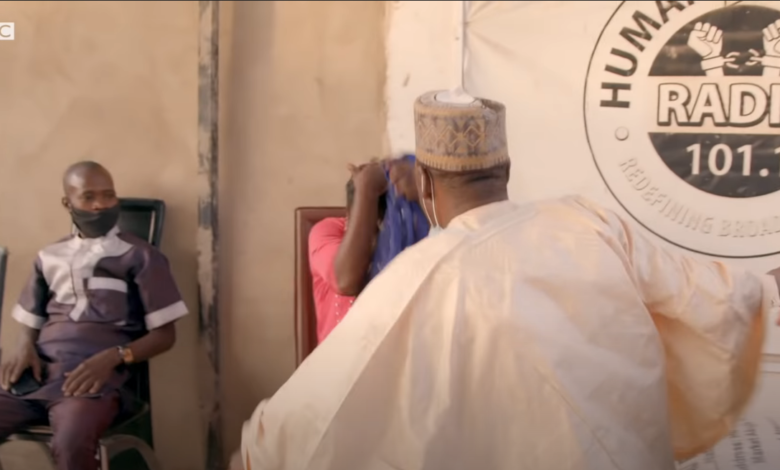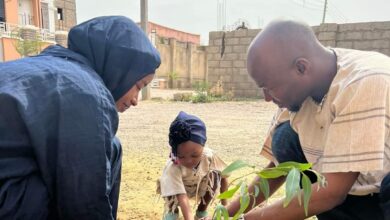Ordinary Ahmed: Broadcaster’s Excesses A Reflection Of Nigeria’s Weak Justice System?
By delegating their duties to non-governmental organisations like Human Rights Radio, Nigeria’s security forces may be creating another window for the abuse of power.

In Nov. 2020, Susan allegedly tied the arms and legs of her niece, six-year-old Rachel and, accusing her of witchcraft, poured kerosene on her hair and set it on fire. The young girl screamed in agony, drawing the attention of neighbours. The incident has since left a huge scar on her head.
Rather than file charges with the Nigeria Police, the family headed to Abuja-based Human Rights Radio, a station that airs the daily radio programme, Brekete Family.
Tina David, Rachel’s grandmother, explained that the police would only delay the case if they were approached directly. “[But] if you go there [Brekete Family], they will answer you quickly,” she told BBC Africa Eye.
In a documentary that premiered on Monday, May 17, the BBC placed the methods of Ahmed Isah, Brekete Family’s founder and host, who is famously known as Ordinary President (or Ordinary Ahmed), under scrutiny.
Brekete Family, which has been around since 2009, uses investigation, mediation, and advocacy to “help citizens, especially indigent populations, access service providers and regulators and demand accountability and compensation for abuses.”
In its report, the BBC highlighted the show’s successes, including how he was able to get the Nigeria Police to swiftly arrest Susan and raise donations for victims of abuse such as Rachel. The report, however, also raised concerns about Brekete Family’s shortcomings as well as the host’s excesses.
Notably, it points out that the programme’s successes are enabled by the general ineffectiveness and lack of faith in Nigeria’s criminal justice system. Also, rather than simply take up cases recommended by the radio host, the police were shown in the BBC’s report to knuckle under Ordinary Ahmed’s influence.
When Susan was arrested by the police in February, for example, the officers first took her to the radio station before starting their investigation.
Ordinary Ahmed then proceeded to interrogate her as she begged for forgiveness and claimed not to know how the incident happened.
“Madam, tell me the truth now. I will give you one last chance,” Ordinary Ahmed asserted. Still not impressed with her response, he thanked “everybody” and suddenly slapped Susan’s cheeks twice.
He then handed her over to the police, who were standing by, because “from the look of things, she is not ready to tell us the truth.”
“The reason I interviewed her on camera is because I intend to use the footage for people to see and get to learn a lesson,” he later told BBC.
“Even the police that you saw working, it is because we are involved. Ordinarily, if this man had walked up to the police and said ‘my younger sister burnt my daughter’s head,’ they would have said either ‘bring money’ or ‘go and settle, it is a family matter.’ We used to have a government, but Nigeria has gone backwards by about 50 years. And that is the reason why almost everybody comes here.”
There is often a crowd of hundreds of people waiting outside the Human Rights Radio premises, all of whom have complaints they wish Brekete Family would listen to and act on. BBC’s documentary noted that some of them had been visiting since 2019 without getting help.
Another problem the television network observed was that some cases were dropped without explanation by Brekete Family after Ordinary Ahmed had promised to follow them up to their “logical conclusion … by the grace of God.”
It further quoted the National Broadcasting Commission (NBC) as stating that it has received “a high number of complaints about the conduct of the station and found that it frequently violates ethical standards.”
Anthony Ojukwu, Executive Secretary of the National Human Rights Commission (NHRC), believes Brekete Family often disregards the international standards for handling complaints about the violation of human rights.
“You [accused persons] cannot just be called on the spot on national radio. You need to be given in advance the allegation against you,” he told BBC.
“Fair hearing entails a lot under the constitution. There are rules of confidentiality. But, you see, they violate all these rules. They want a media trial, for the public to see them as the messiah by doing this thing publicly. You now undermine the right to privacy of people… Ahmed Isah is a law unto himself.”
Despite the criticisms, Brekete Family has for many years been instrumental in getting justice for aggrieved Nigerians who have exhausted other means. Even police officers have benefited from the programme’s advocacy, with the force headquarters righting wrongs done to law enforcement agents after its intervention.
Experts note that many people run to Brekete Family for assistance because institutions established by the government to protect human rights are ineffective.
Ordinary Ahmed himself said in 2018: “The laws are there but the enforcement is nothing. Implementation — zero. It is as good as not being there. The laws only favour the rich and the mighty in the country, ordinary Nigerians are not being protected.”
But by delegating their duties to non-governmental organisations like Human Rights Radio, Nigeria’s security forces may be giving room for another means through which power can be abused while downplaying complaints sent directly to them.
Meanwhile, Ordinary Ahmed has not responded officially to the allegations contained in BBC’s documentary. He, however, tweeted this hours after the report’s release: “My God has made me bigger than the sponsors of my detractors.”
Support Our Journalism
There are millions of ordinary people affected by conflict in Africa whose stories are missing in the mainstream media. HumAngle is determined to tell those challenging and under-reported stories, hoping that the people impacted by these conflicts will find the safety and security they deserve.
To ensure that we continue to provide public service coverage, we have a small favour to ask you. We want you to be part of our journalistic endeavour by contributing a token to us.
Your donation will further promote a robust, free, and independent media.
Donate Here




